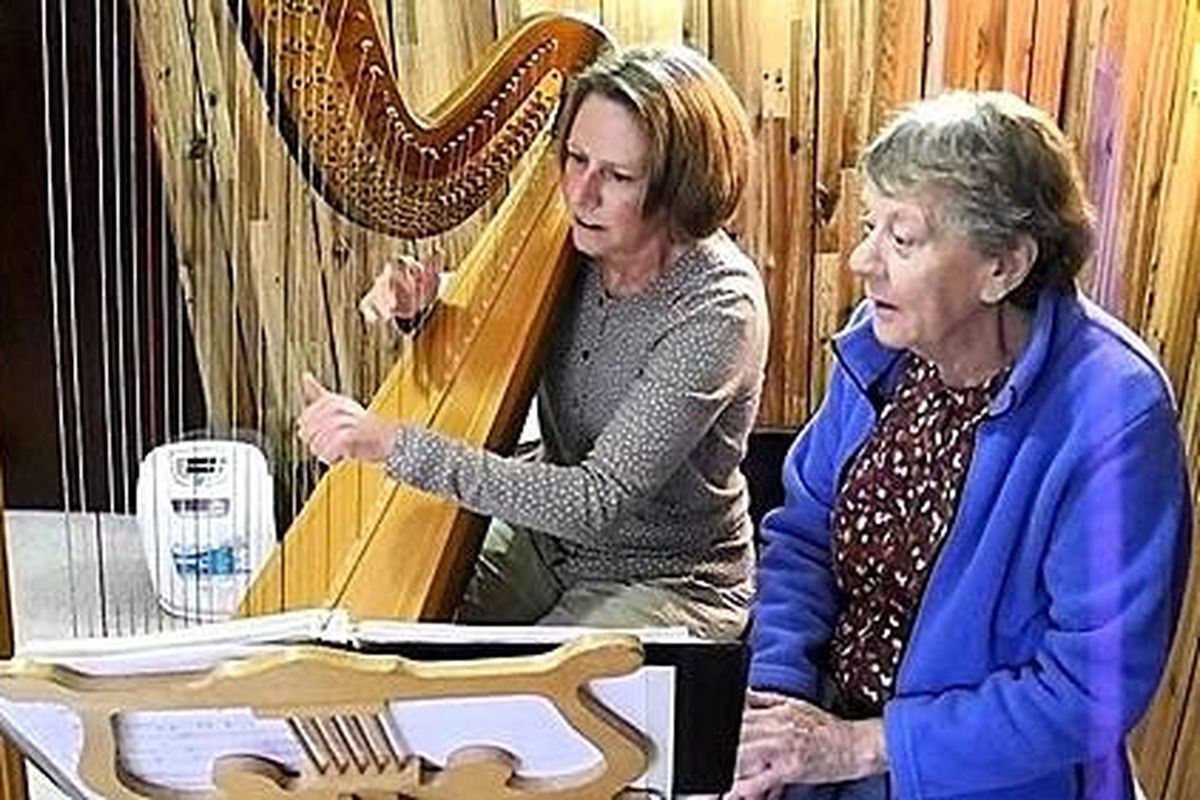Spokane Harp Circle members play and learn together; some provide music therapy

Every month a group of harpists gathers in a north Spokane church to play together, mentor each other and learn new techniques. Though it’s called the Spokane Harp Circle, members come from all over, including in Colville and Coeur d’Alene.
The group was launched about 15 years ago by harp performer and teacher Nancy Davis. Harpist LuRicka Kougl joined the group in 2009 and hosted the monthly gatherings in her home for a few years. “I had to move furniture to accommodate 13 harps,” she said. “You share with each other musical experiences and learn to play in a group.”
The group plays together for the first hour or so, then works on new techniques during the second hour, said member Barbara Heckenlively. “It’s a mentoring type experience,” she said. “The beginners are included and we all play together.”
Members also can perform solo at the gatherings. It’s a good way to get used to performing, Heckenlively said. “You want to get these experiences as you learn because it builds your confidence,” she said. “Most of performance is courage. You have to have courage.”
The group is led by professional harpist Kim Davidson. She grew up playing duets with her mother, Joan Davidson, who had Alzheimer’s disease and died earlier this month. When her mother became ill, the two couldn’t play duets anymore, Davidson said. Instead, she would bring her harp to her mother’s retirement home and play for her. Sometimes her mother would sing, including the harmonies, as she played.
Eventually her mother couldn’t remember Davidson’s name, she said. Playing music “was really a way of bonding and connecting with her,” Davidson said.
Both Kougl and Heckenlively grew up playing the piano and got into harp playing by accident. Kougl said she started in 2002. “My son wanted to play,” she said. “I rented a harp. I fell in love with it and he moved on.”
Heckenlively and her husband were in the process of moving to Spokane from Reno, Nevada, in 2003, when her husband met a pastor who needed a pianist at his church. She agreed to take on the role and met the church’s harpist, who persuaded her to take up the instrument.
“I never, ever planned on buying a harp or playing a harp,” she said. “Because I played the piano it was easy to pick up.”
Some of the members of the Harp Circle are thanatologists, who do music therapy and work with Horizon Hospice to provide peaceful end-of-life transitioning. Some have also trained in a similar program called Harps for Healing.
“The strings are resonating at the same frequency your heart is,” Kougl said. “That’s why it’s so therapeutic.”
It’s possible for a listener to be so in tune with the music that their heart rate slows to match the tempo. Kougl said it’s something she and her fellow harpists have to be aware of as they play, particularly when they play for the sick or the elderly. “It does have a physical effect,” she said.
Both women like to use what are commonly known as Celtic harps. “Thirty-four strings is the size that we like,” Heckenlively said. “It has a low C. These are easier to haul, too.”
Both women say the love the unique sound a harp produces. “I think really the warm tone,” Kougl said. “It’s really a forgiving instrument. It really has a lot of grace and celestialness.”
Kougl said she used to play at Sunshine Health and Rehab every week. There was one woman who was usually agitated, but she transformed when Kougl started to play. “I would play and she would be calm for an hour,” she said. “That’s the power.”
Heckenlively said she likes how the music touches people emotionally. “It’s a special tone,” she said. “It’s the simpler music that seems more touching.”
Heckenlively said the instrument is relatively easy to learn. “Anybody can come and pick out a melody on the harp and it will sound beautiful,” she said. “Immediately you get enjoyment from it. It’s like God designed it that way.”
The Harp Circle has performed at a variety of events over the years. They once marched in the Fourth of July parade in Coeur d’Alene, each harpist carrying a small, hand-held harp called a harpsicle. Some members play for Hospice patients, others play at retirement centers, nursing homes, weddings and funerals. Heckenlively is one of two members who plays at weekly church services.
The group meets every month, alternating between Trinity Baptist Church, where Heckenlively performs each Sunday, and First Presbyterian Church.
Those interested in learning more information about the group can contact Davidson at (208) 771-2606 or kimharpist@frontier.com.
nculver47@gmail.com